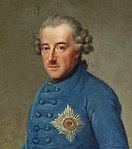
Frederick the Great (1712–1786) was King of Prussia from 1740 until his death. His most significant accomplishments included his military successes in the Silesian wars, the First Partition of Poland, and his patronage of the arts and culture. Prussia became a major power in Europe under his rule. Frederick was a proponent of enlightened absolutism, stating that the ruler should be the first servant of the state. He modernised the Prussian bureaucracy, reformed the judicial system, encouraged immigrants of various nationalities and faiths to come to Prussia, and increased freedom of the press in Berlin. Frederick was also an accomplished musician, writer, and philosopher. He played the flute, and wrote over 100 scores, including flute sonatas and opera libretti. His collected works of poetry, histories, and philosophy spans 30 volumes and his political correspondence spans 46 volumes. He remains an important symbol of modern Germany to this day. (Full article...)